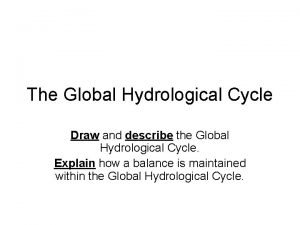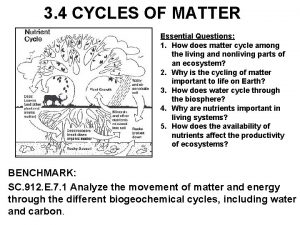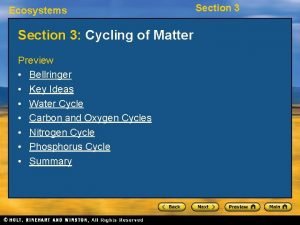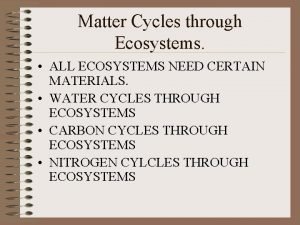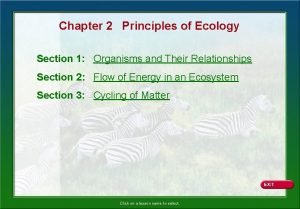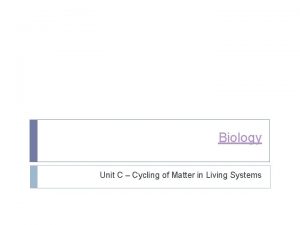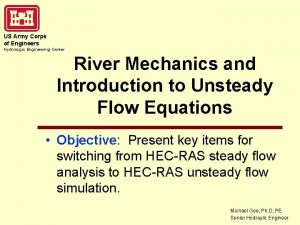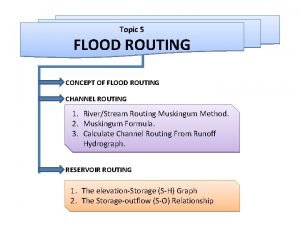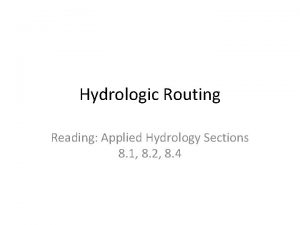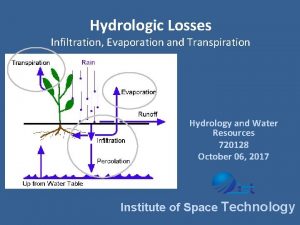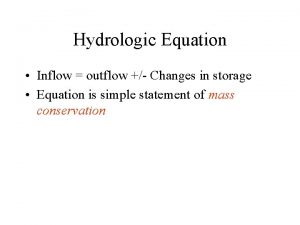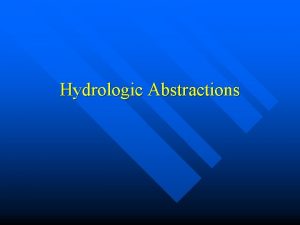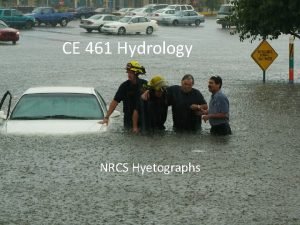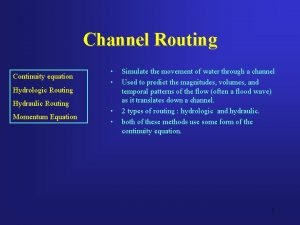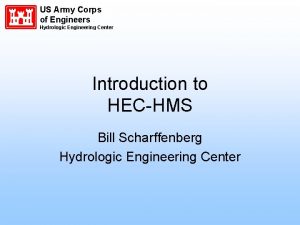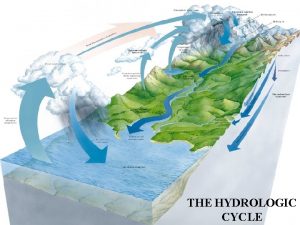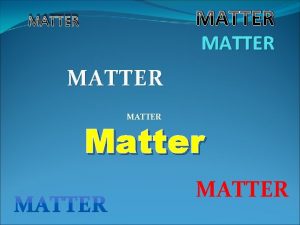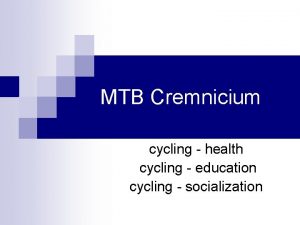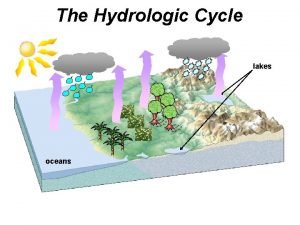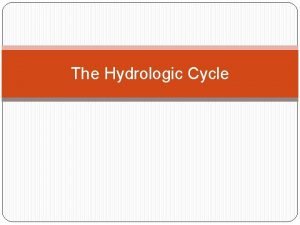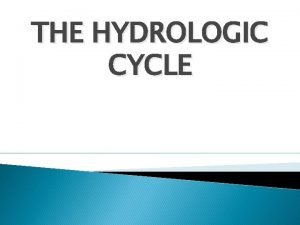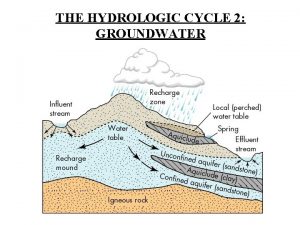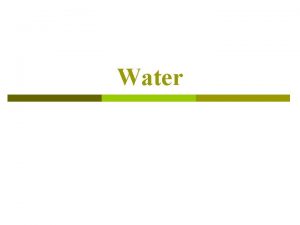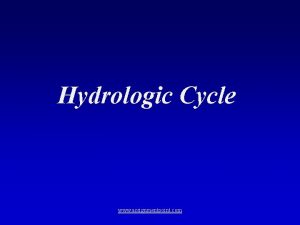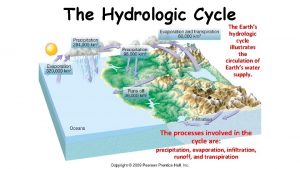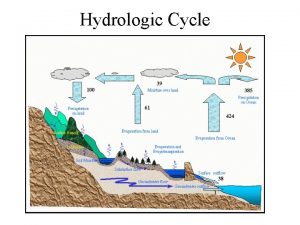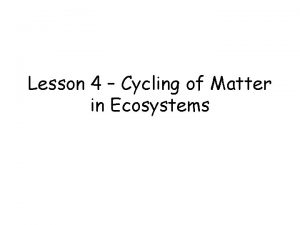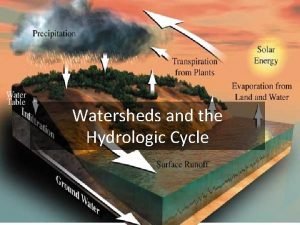Cycling of Matter 13 5 Hydrologic Cycle Hydrologic

















- Slides: 17

Cycling of Matter 13. 5

Hydrologic Cycle • Hydrologic cycle: circular pathway of water on Earth from the atmosphere to the surface, below ground, and back • 4 pathways

4 Pathways 1. ) Precipitation: rain or snow falls to ground from the atmosphere 2. ) Evaporation: water reenters the atmosphere 3. ) Transpiration: evaporation that occurs between plant leaves and the atmosphere 4. ) Condensation: water vapor condenses and forms clouds which return water back to the surface

Hydrologic Cycle precipitation Surface runoff seepage groundwater condensation evaporation transpiration

Biogeochemical Cycles • Movement of a particular chemical through the biological (living) and geological (nonliving) parts of an ecosystem - Oxygen cycle - Carbon cycle - Nitrogen cycle - Phosphorus cycle

Oxygen Cycle • Oxygen cycles indirectly through an ecosystem by the cycling of other nutrients • The main processes involved in the oxygen cycle are photosynthesis and respiration

• Plants release oxygen as a waste product during photosynthesis • Humans & other organisms take oxygen in and release it as CO 2 through respiration

Oxygen Cycle oxygen photosynthesis respiration Carbon dioxide

Carbon Cycle • Carbon is the building block of life— it is an essential component of carbohydrates, proteins, fats, & other organic molecules in our bodies • Carbon moves from the atmosphere through photosynthesis then through the food web

• Carbon is returned to the atmosphere as CO 2 by respiration or the decomposition of dead organisms • The burning of fossil fuels also adds carbon to the atmosphere

Carbon Cycle CO 2 In air combustion respiration photosynthesis respiration Decomposition of organisms Fossil fuels photosynthesis

Nitrogen Cycle • Most of the nitrogen cycle takes place underground • Nitrogen fixation: bacteria convert gaseous nitrogen from the atmosphere into ammonia NH 3

• Some nitrogen fixing bacteria live on the roots of plants while others live in the soil • Denitrifying bacteria release nitrogen gas back into the atmosphere

Nitrogen in atmosphere animals plants Nitrogen-fixing bacteria in roots Nitrogen-fixing bacteria in soil Denitrifying bacteria nitrates decomposers Nitrifying bacteria nitrites ammonium

Phosphorus Cycle • Takes place at & below ground level—does not include the atmosphere • Phosphate is released by the weathering of rocks • Phosphorous moves through food web and returns to soil during decomposition

• Phosphorus leaches into groundwater from the soil and is locked in sediments Weathering of phosphate In rocks Plants & animals Phosphate In soil decomposers leaching Sedimentation forms New rocks

Cycles of Matter Posters Create a poster with your group illustrating your assigned cycle. Your poster boards should include: • Elements essential to the cycle • The processes involved in each cycle • The direction of the flow of nutrients The information is the most important part of your poster. Get it down first, then add pictures. You may draw these or cut them out from magazines
 Water cycle the hydrologic cycle
Water cycle the hydrologic cycle 4 cycles of life
4 cycles of life Section 3 cycling of matter
Section 3 cycling of matter Section 1 organisms and their relationships
Section 1 organisms and their relationships Matter cycling in ecosystems
Matter cycling in ecosystems Principles of ecology chapter 2
Principles of ecology chapter 2 Section 1 organisms and their relationships answer key
Section 1 organisms and their relationships answer key Cycling of matter definition biology
Cycling of matter definition biology Hydrologic engineering center
Hydrologic engineering center Reservoir routing and channel routing
Reservoir routing and channel routing Hydrologic routing
Hydrologic routing Infiltration
Infiltration Storage equation
Storage equation Hydrologic abstractions
Hydrologic abstractions Continuity equation hydrology
Continuity equation hydrology Objectiveable
Objectiveable Continuity equation
Continuity equation Hydrologic engineering center
Hydrologic engineering center
